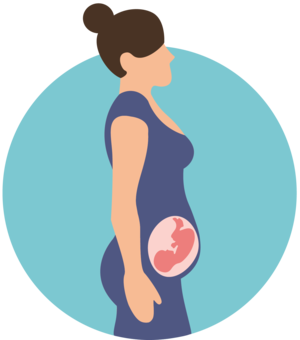Pregnancy at week 30
4-minute read
Your baby
Your baby is now laying down fat stores, which makes them look plumper and smooths out the wrinkles in their skin. They weigh about 1.3 kg. The fine hair, known as lanugo, that was covering their body is disappearing and more hair is growing on their head. By now, their toenails have developed.
Their reflexes are also developing, and they may be sucking their thumb or fingers. They are aware of the Braxton Hicks contractions.
Your baby at 30 weeks
| Length: | 27cm (head to bottom) |
| Weight: | 1.3kg |

Your body
As you gain weight and your baby grows, your ligaments are stretching and you might find it quite uncomfortable to sit in some positions or stand for a long time.
Many women develop backache during the third trimester. It’s important to have good posture all the time and to consider wearing flat shoes from now on. You can support your back with a cushion when you’re sitting. Take extra care with lifting.
You have twice the normal amount of blood in your body now. Your doctor or midwife will take your blood pressure at every visit. About 1 in 10 women develops high blood pressure while they are pregnant. However, high blood pressure can also be a sign of pre-eclampsia, which is a more serious condition.
Things to remember
Even if you’re feeling tired and uncomfortable, it’s still important to exercise. It will give you more energy and will help you to stay fit in preparation for the birth.
As your shape changes and your ligaments get looser, your balance may be affected and you may be at higher risk of injury. In the third trimester, it’s best to choose walking, swimming or stationary cycling for exercise. Try to avoid activities on your back, or high impact jumping and bouncing exercises, since these can put more strain on your pelvic floor muscles.
Try also to exercise on most days of the week — up to about 300 minutes of moderate physical activity every 7 days. Talk to your doctor about what level of exercise is safe for you.
Read next

Your pregnancy at 31 weeks
Learn about your pregnancy journey and what is happening to you and your baby.

Speak to a maternal child health nurse
Call Pregnancy, Birth and Baby to speak to a maternal child health nurse on 1800 882 436 or video call. Available 7am to midnight (AET), 7 days a week.
Learn more here about the development and quality assurance of healthdirect content.
Last reviewed: August 2020




